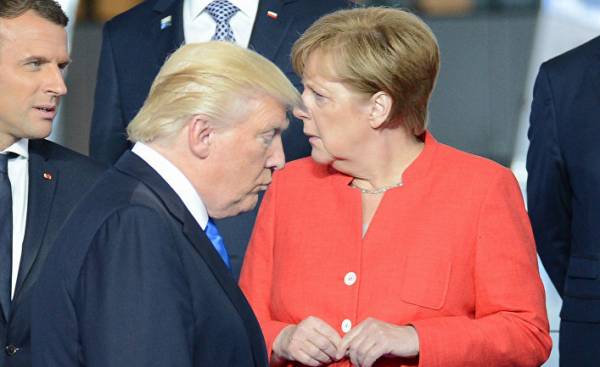
Without waiting for the signing by the President of the United States of the bill on new sanctions against Russia, Iran and North Korea, the Minister of economy of Germany, Brigitte tsipris has announced that new U.S. sanctions run counter to international law. Such statements previously announced by the foreign Ministry of France.
Why so worried Germany, because for the last few years, the EU itself has repeatedly imposed unilateral sanctions against Russia and the former Ukrainian politicians?
The explanation is simple — the Nord Stream 2, construction of export gas pipeline of the Russian Federation.
The sanctions allow the President of the United States to punish companies that are involved in the construction or operation of export pipelines of Russia, wherever such companies are in the US or abroad. Nord Stream 2 — new export gas pipeline of the Russian Federation, and its main investors are the German energy giants.
If you take only the legal dimension of the dispute, we must admit that the task for the lawyers of the German government is extremely difficult to substantiate the illegitimacy of certain kinds of sanctions, while maintaining the Institute unilateral sanctions as such.
The use of unilateral economic sanctions at the moment is governed by international law is very vague. There is no specific international Treaty or custom, which would establish exactly when and what sanctions can be applied, and when it will be illegal.
This is not surprising, since the major players in this field — the EU and the USA on the one hand, not particularly eager to limit their options, and with another — not too require the consent of other States to conduct its sanctions policy.
However, is there in international law, any rules which could regulate the application of sanctions?
At first glance, the analogy with the right to use force in international relations.
One of the major achievements of international law in the last century was the establishment of the UN Charter prohibition on the use of force and threat of force. Until the twentieth century, the use of force in international relations was considered lawful (“the right war”). When the United Nations attempted to ban the use of force, except with the authorization of the Security Council or in self-defense.
As you know, this attempt, by and large, failed because of a lack of consensus among permanent members of the Security Council. Until 1990, the security Council authorized the use of force only once — during the Korean war, and only because the USSR delegation had not participated in the vote.
In a situation of legal vacuum States actually returned to the previous position, when war again became the “last argument of kings.” In response, the international humanitarian law gradually established rules of legitimate use of military force: necessity, proportionality and selectivity.
The question of how all these rules can be applied to “economic” power, is still open.
Specific decisions of international courts that have recognized the applicability of these principles, yet. However, economic sanctions have recently become increasingly popular and more and more destructive, causing the need for their regulation. Consensus, however, this issue is not observed.
The second obvious option — challenging the sanctions at the WTO. It’s hard to deny that the sanctions, particularly in the new expanded version, will influence international trade in goods and services.
Immediately after the introduction of international sanctions in 2014, Russia intended to challenge the individual elements of the sanctions regime under the WTO, but the case at the time decided not to continue. However, more sensitive sanctions could make Russia more aggressive.
According to many commentators, challenging the sanctions against Russia in the WTO may be the right of member States to take measures to protect national security. Existing sanctions are justified by the need to protect international peace and security in connection with events in Ukraine.
Given the fact that the existence of such a threat has been recognized by many international organizations, including the UN, the probability of successful defence is high enough.
It is unlikely that the WTO will take the liberty to decide what measures adequate to such grave danger.
Finally, decisions of the Body of WTO dispute resolution, though mandatory, are not enforced by force. If suddenly all of the WTO decision, which is contrary to the declared interests of national security, the US is almost guaranteed to ignore it.
Accordingly, the whole long procedure of the WTO no practical result will not bring.
Finally, it was argued that US sanctions can be viewed as a violation of state sovereignty (one of the basic principles of international law since the seventeenth century) by extending the territory of the EU of the jurisdiction of the United States.
Actually the US is famous for its laws that establish the jurisdiction of American courts in situations which at first glance do not deal with the United States. For example, any money transfer using correspondent accounts in us banks located in us jurisdiction, even if both parties to the transfer are foreigners.
This is the traditional approach to establishing jurisdiction of the courts in the Anglo-Saxon system: the courts as a General rule can theoretically (although in practice and should not) consider any disputes that are not necessarily related to their jurisdiction.
In fact, the Ukrainian court similarly may extend its jurisdiction to a foreigner who has no or very little relation to Ukraine, if there are certain conditions — for example, it is the Respondent Ukrainian, or it is related to the injury in the territory of Ukraine.
Jurisdiction outside the state court not so unimaginable thing — in almost all States, the courts do this from time to time.
Therefore, the argument of violation of sovereignty, at least in its straightforward formulation does not look promising. Although formally the US and extend its laws theoretically for all companies in the world, to bring them to justice can only be on-site.
Other States are free to take or not to take into account the decisions of American courts in such cases — so States protect their sovereignty.
In General, the challenge of new us sanctions in international law seems problematic. Rather, this dispute will be resolved efficiently within the framework of political negotiations.







